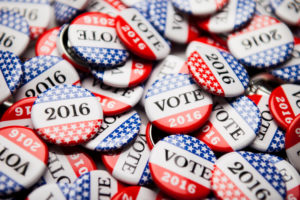 My first job out of college was as a Congressional intern on Capitol Hill, in Washington, D.C. I took the job in hopes of it leading to something with journalism or public relations. What it led to was a new interest in America’s political system and a stint working for a few Members of the House of Representatives. Growing up, I had no interest in politics. But once I spent some time in Washington, I was obsessed.
My first job out of college was as a Congressional intern on Capitol Hill, in Washington, D.C. I took the job in hopes of it leading to something with journalism or public relations. What it led to was a new interest in America’s political system and a stint working for a few Members of the House of Representatives. Growing up, I had no interest in politics. But once I spent some time in Washington, I was obsessed.
Working in Washington, I learned so much, and now yearn for the excitement of an election year, because I actually understand what is happening. I’ve enjoyed the challenge of teaching my young students about the election process too. We keep it basic – voting for their favorite book or snack, and discussing why everyone can have a different opinion.
Here are some ways I teach my students and my own children about the election process:
- Be objective – Kids tend to echo the political views of their parents. It is humorous (or maybe alarming?) to hear kindergarteners going back and forth, saying “I like so-and-so.” I know they have no idea why they “like” that candidate. They are just repeating what they hear around the house. My husband and I try to be as careful as we can about what we say at home, especially if it is something negative about a candidate. We save that talk for after the kids are asleep. If asked why you like a particular candidate, stick to the easiest issues. Be sure to remind your kids that people do have opposing views regarding politics, and it can be discussed in a respectful manner.
- Stick to the basics – If your child asks about the election, take the opportunity to talk with then about basic election concepts. This is what I do in my classroom. We talk about what it means to vote for something, and how everyone should have the chance to vote. We have an election for a favorite book. I read them three books, then the kids draw a campaign poster for their favorite. Later in the day, they fill out a voter registration card, and fill out a ballot for their favorite book. Our principal then reads the election results on the announcements at the end of the day. The kids love it!
- Actively engage older kids about the election – Don’t wait for them to bring it up. Find out what they’ve heard, ask their opinion on what they’ve seen. Discuss the issues, not the candidates. Ask them what affects them or their community directly. It is easier for them to relate to something on a local level.
- Read books about the election process – There are many excellent books about elections for all age groups. As I said, I’m slightly obsessed with the political process in the United States. Most of these titles are on my shelf, with the first three being the ones my kids vote on in our class:
- Grace for President by Kelly DiPucchio (grades K-2, fiction)
- Duck for President by Doreen Cronin (grades pre-K-1, fiction)
- My Teacher for President by Kay Winters (grades K-3, fiction)
- One Vote, Two Votes, I Vote, You Vote by Bonnie Worth (grades pre-K-2)
- E is for Election Day by Gloria M. Gavris (grades K-2, nonfiction)
- The People Pick a President by Carolyn Jackson (grades 3-5, nonfiction)
It is tough to simplify the election process for younger kids. Let the authors do it for you!
- Find out what your kids already know – Even preschoolers know their parents and other adults are going to vote for a new president soon. Most kids have heard about the election from either friends, family, or the media. Get an idea of what they are hearing, and make sure they can handle it with your help. If they’ve heard a lot of negative talk, focus on the positive. Talk about the strengths of each candidate, no matter how tough you think that is.
Parents and teachers have important roles to play in helping our children become responsible citizens. Goodness knows this election has been contentious at the very least. So, in a year like this, we have to do our best to help kids grow to understand the importance of making their voice heard, and respecting other people’s opinions.


